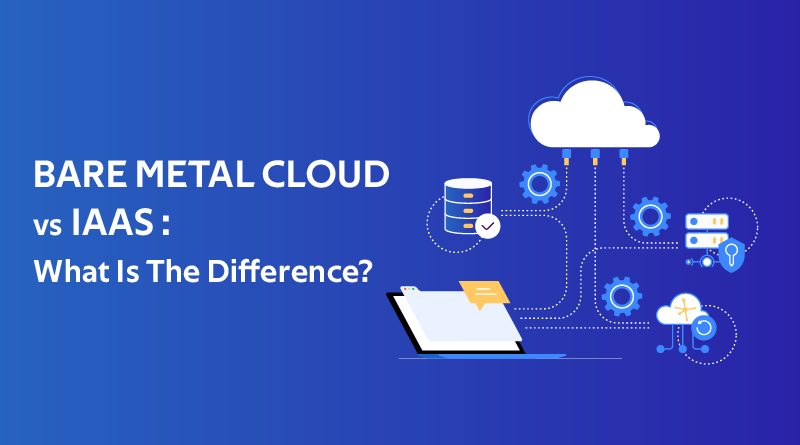Every business tries to improve performance with dedicated resources offered on demand. If your enterprise is growing rapidly, clearly you are in search of an optimum and convenient hosting platform to handle a large amount of data. There are two extensive options, in this case, bare-metal cloud and IaaS. Cloud server solutions are well known; however, a new tech addition named bare-metal cloud is gaining importance gradually. Which one is the better solution – bare metal cloud or IaaS? This article will help you to have a clear picture of the contrast between the two.
Before we find out more about bare metal server and IaaS, it is necessary to know the two basic types of server requirements.
What Is A Dedicated Server?
A dedicated server is a physical storage device and it provides the services of operating systems, virtual servers, and hypervisor layers. It is entirely dedicated to an application or an individual. The dedicated servers are highly customizable appliances by users and can be used for hosting or to offer specialized services.
They offer improved performance, better customizability, and higher data security. If the traffic of your website is growing or security of customer data is your concern, or you need less downtime of your website, and if you want full control of your server, then a dedicated server is the best solution for you.
Related: Top 5 Benefits Of Fully Managed Dedicated Server
What Is A Virtual Server?
A virtual server, sometimes called a virtual machine, is a software-defined server. It runs on top of a physical machine, like a dedicated server. Virtual servers require physical machines to perform. Virtual servers offer services to multiple tenants. Even then, you get a single-tenant-like service to your virtual resources. This is only possible because the hardware resources used here are divided among various virtual machines. The good point of a virtual server is its flexibility and services offered at a low cost. It offers you a pay-as-you-go model, which means your billing is done on your usage.
Having known about the definitions of the servers, it will be easier for you to understand the basic differences between bare metal cloud and IaaS.
Related: VPS Hosting Pros And Cons: Things To Consider Before You Buy It!
What Is IaaS?
IaaS or Infrastructure-as-a-service is similar to a cloud service that runs on a distributed environment that offers virtualized and multi-tenant servers. Using IaaS, businesses can negate the high cost of owning and managing servers by them. On the contrary, they avail the services of IaaS. The users of IaaS can access the services and resources offered through a wide area network or WAN, here internet. This platform enables them to run any application or operating system of their choice without bearing the operating and maintenance costs of those servers. Customers can avail service of IaaS in three different service models:
Private cloud:
This service is offered for the exclusive use of one single enterprise.
Public cloud:
Here the service is for use by multiple organizations.
Hybrid cloud:
In this service model, a company does leverage both private and public cloud to run the applications.
Pros of IaaS:
- Cost-efficient: In IaaS, you will not be charged for all the hardware resources. You only pay for your usage. Here, the fees are calculated through usage-based metrics.
- Highly scalable: High scalability of IaaS is its main benefit. This server scales the workload depending on the number of your visitors.
- Customizable: IaaS is highly customizable. You can add hardware resources like RAM as per your requirements.
Cons of IaaS:
- Shared hardware: The resources of IaaS are shared by many tenants. If one user among them starts to process a large data, you may face reduced power; as a result, increased downtime of your application.
- Unexpected costs: You pay as you use in the IaaS server platform. In such a case, your monthly bill can increase and even go to a peak based on your high usage.
- Process changes: IaaS may need sudden changes based on your usage and workflow.
- Security risks: IaaS provides the infrastructure; however, users are responsible for any type of security breach. The chances of a security breach are also high as this platform is shared by many users.
What Is A Bare Metal Cloud?
Bare metal cloud servers and dedicated servers are almost alike in their performance and service. Both of them are single-user machines that offer the users complete access to the underlying hardware. This happens as it is devoid of any hypervisor layer to build separate virtual machines (VM) on the server.
Otherwise, this server eliminates the need for layers by installing the operating system directly on the server. Bare metal cloud servers provide the best configuration, like processors of new generations, best quality RAMs, and SSDs. These best features of bare-metal clouds confirm the best performance of bare metal clouds, in some cases even better than dedicated servers.
Related: Bare Metal Servers, Restore, Backup & Recovery: What Do You Need To Know?
Pros of bare metal cloud
- Complete Hardware Resources: The users can enjoy the benefit of the whole machine performance as bare metal servers offer a single physical machine for a single tenant. Performance failure and performance degradation are rare here and as a result server downtime is far less.
- Superior performance: If your business needs better performance, then bare metal servers are for you. No doubt, they will offer you better performance managing increased workload at ease. Any application that needs more resources, sensitive applications, and large data processing runs better on the bare metal cloud.
- More secured: Bare metals are single-user servers. So, the users enjoy fewer security threats. If your application contains sensitive information like confidential emails, and customer information like debit and credit card numbers, you should opt for this.
- Cost predictability: Bare metal clouds are bundled with fixed bandwidth in most cases. It eliminates the need to worry about exceeding costs.
- Root access: It offers better options to customize as you like.
Cons of bare metal cloud
- High price: Bare metal cloud servers will cost you a higher price. However, if you have huge customers and large data to handle, the price will not be an issue. But, this server solution will not be a good choice if you don’t have that capacity.
- Not scalable: It is not scalable.
Where IaaS Is Used?
IaaS platform is used in a variety of cases. Some of the common instances:
- Testing and development environments: Organizations are offered excellent flexibility from the IaaS platform. This feature is excellent for this environment as it can be easily scaled up or down as the needs of the organization.
- Hosting customer-oriented websites: IaaS is a good option to host this type of website.
- Data storage, recovery, and backup: Business enterprises find IaaS the easiest and most convenient way to manage data in case of unpredictable and increased demand.
- Web applications: IaaS offers the platform and infrastructure to host web applications. In this case, IaaS provides necessary resources like servers, networking, and storage resources.
Where Bare-Metal Cloud Is Used?
In case your need is full hardware control and high-performance support from a single user server with the cloud-like potential of scalability. Some of the popular uses of bare metal cloud are:
- E-commerce websites: E-commerce websites generally face huge and inconsistent traffic all over the year. In almost all cases, bare metal clouds help to meet this type of challenge.
- Big data processing: Bare metal cloud is the right choice for you if you process a huge amount of data constantly.
The Similarity Between Bare Metal Cloud & IaaS
Bare metal cloud is considered a subset of IaaS. Though they both are cloud services, their offerings are different. IaaS is defined as the provision of virtual resources, and a bare-metal cloud gives access to dedicated servers and virtual resources.
In both scenarios, you get access to a server where the OS and applications of your choice can be installed. The only difference is that in IaaS you have very less control over that infrastructure.
Unique Benefits Of Bare Metal Cloud
Bare metal clouds are beneficial for any type of business for various benefits. They are an extremely popular solution for their excellent level of power, performance, and security. Industries like financial services, banking, government, and health care organizations depend on bare metal cloud solutions. Database applications or business intelligence systems do fit well on them. Bare metal clouds are used as an affordable way by advanced software development companies to launch and test their products. Those industries like to opt for this solution for perfect data operations, higher data security, and best performance.
In enterprise-level infrastructure, a bare metal cloud is vital for an effective hybridization of a cloud solution. Mobile gaming or advertising platforms rely on this platform as they deal with large volumes of data requiring high-performance scalability.
Which Is The Right Option For You?
Your choice depends on your viewpoint and usage. Many organizations choose IaaS for the offerings of virtual resources. Instead, some choose bare metal cloud solutions as this is considered a true IaaS solution where virtualized resources are offered in form of PaaS or platform as a service. On the other hand, in the bare metal cloud, you are offered fully dedicated servers. It depends on you how you will use those resources and also you can decide how many virtual machines you want to run in case you are planning to install a hypervisor.
Conclusion
If you want a cloud service where you gain full control of your server environment, the bare metal cloud is best for you. This shift depends on your cost and usage scenarios. Bare metal clouds offer excellent service at a consistent and fixed cost, not like fluctuating cost of IaaS.
However, the ultimate choice depends on you what you want, bare metal cloud or IaaS. Whether or not you go with the bare metal cloud depends on the level of processing power you need, the additional security required, and if you need root access to all the systems on the server with increased scalability as compared to the dedicated servers or cloud servers. Ultimately it is your choice between bare metal vs cloud but you can select between VM cloud solutions as they can be easily set up and are more affordable.







